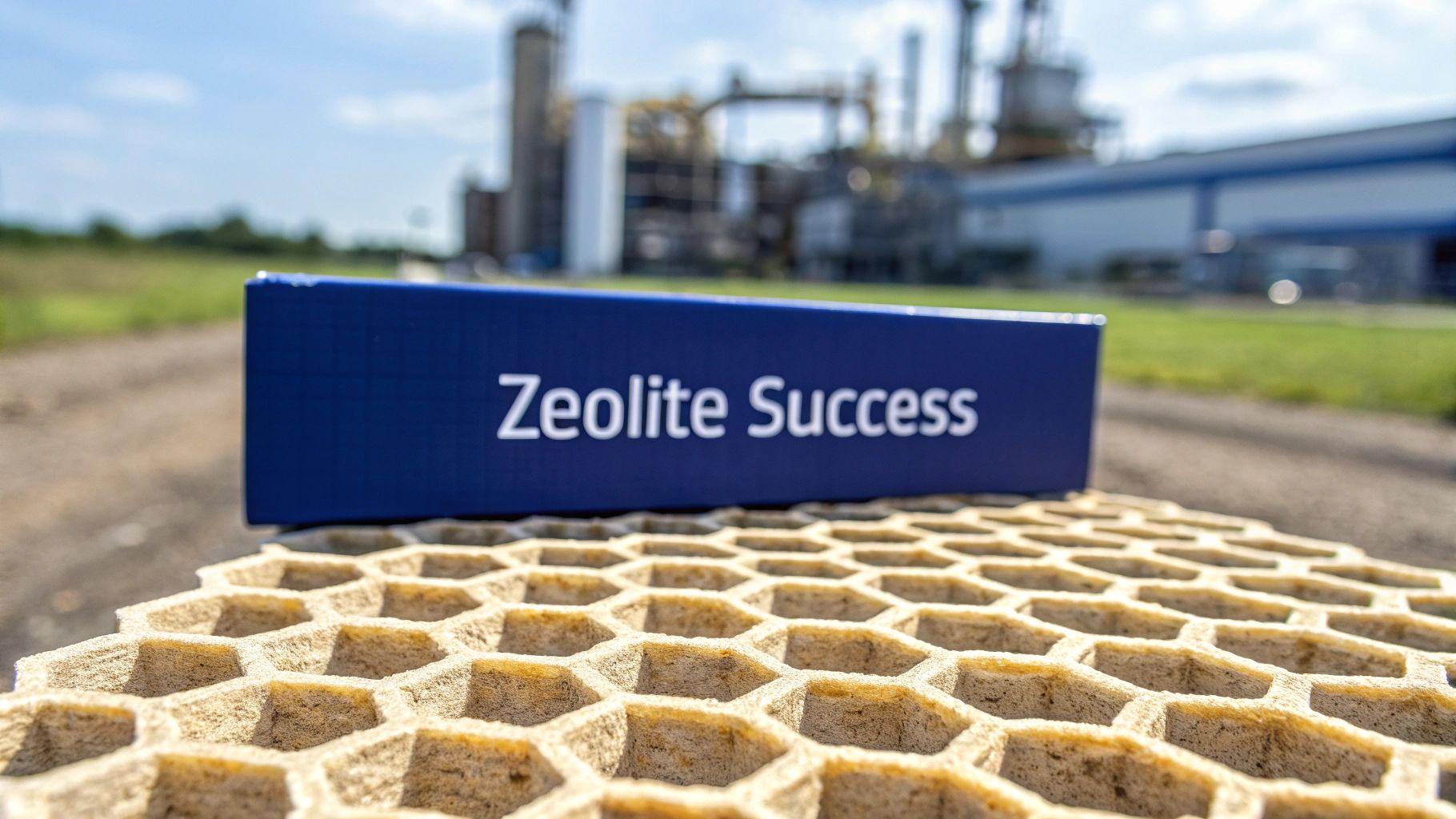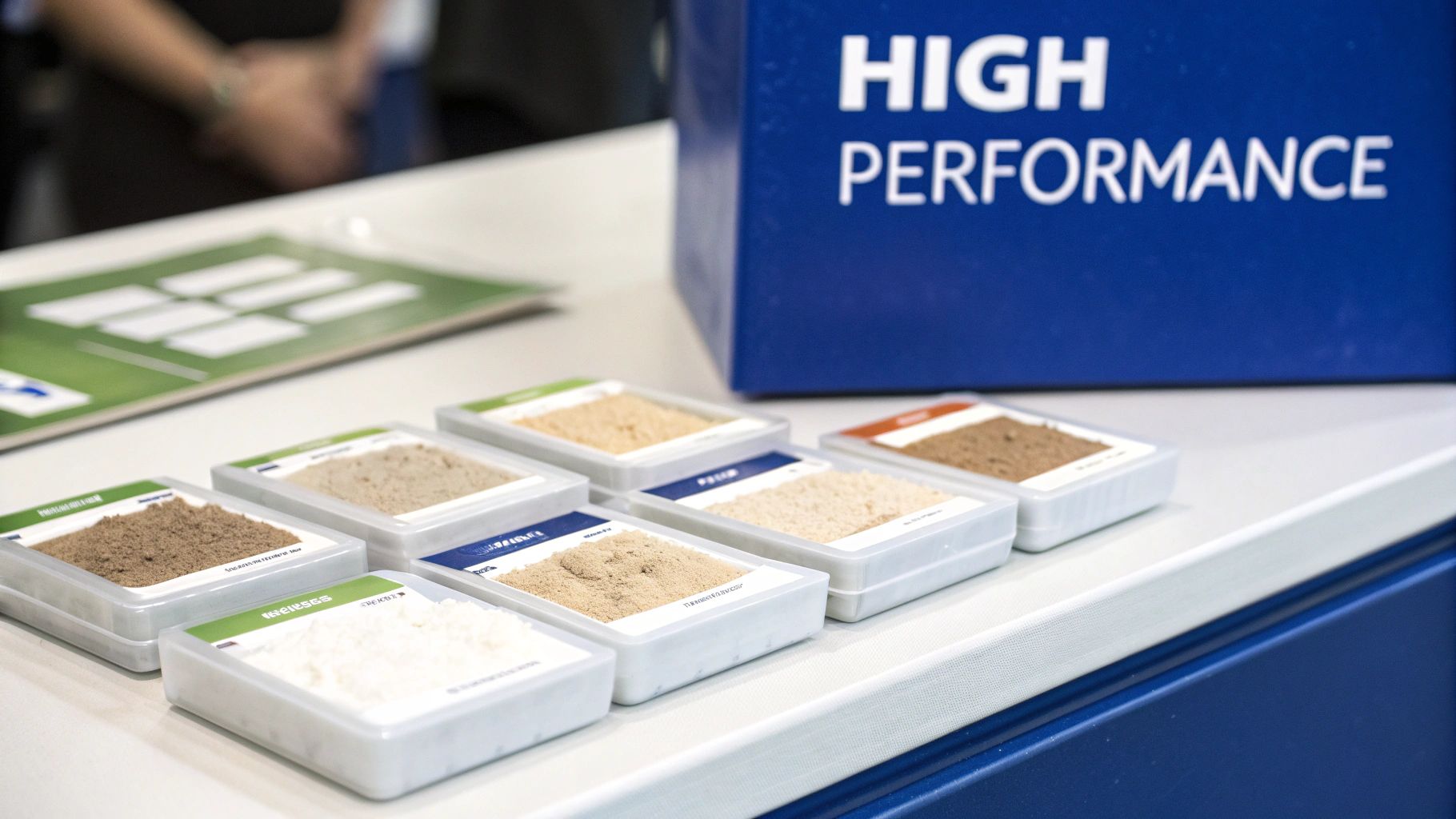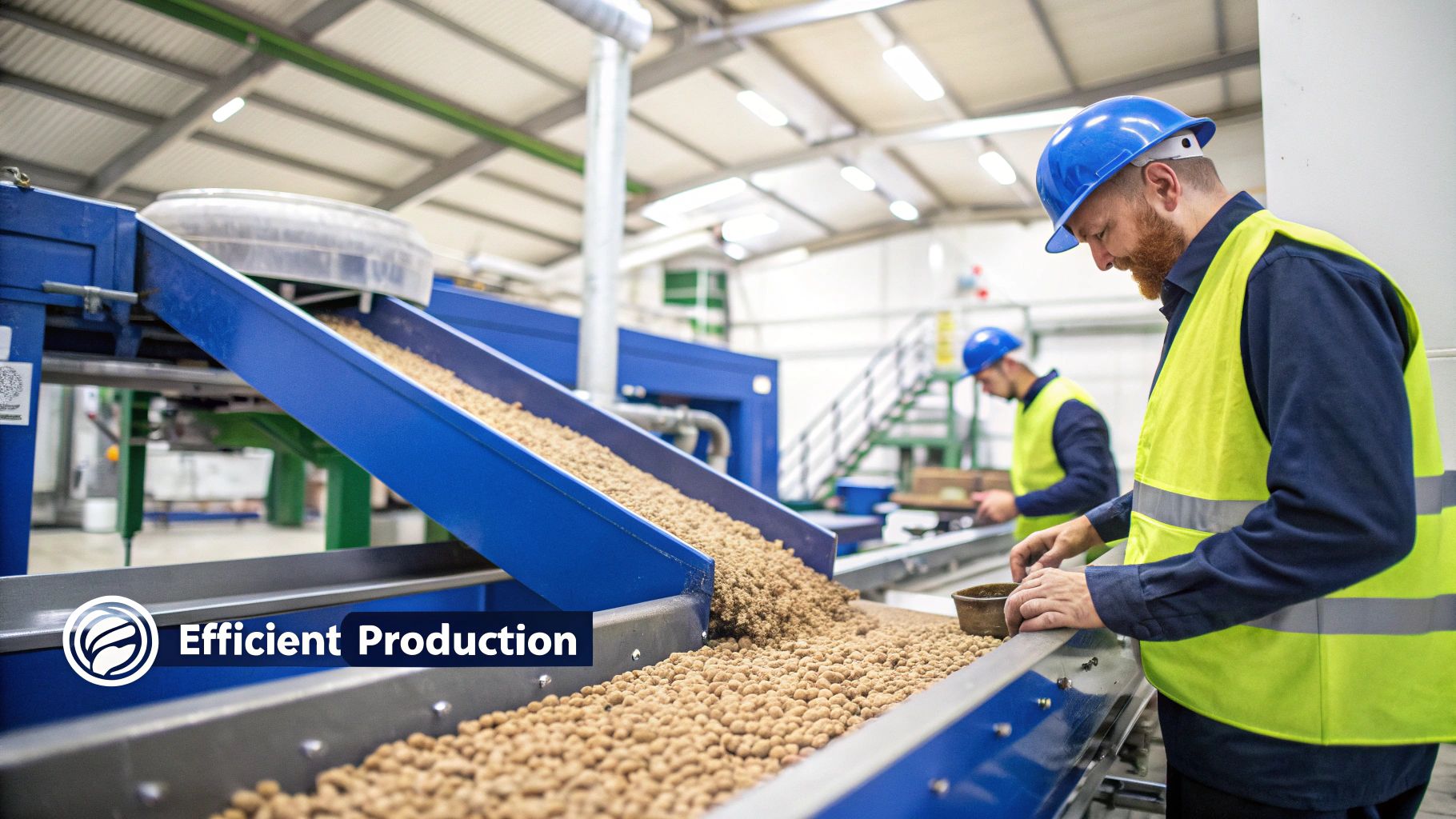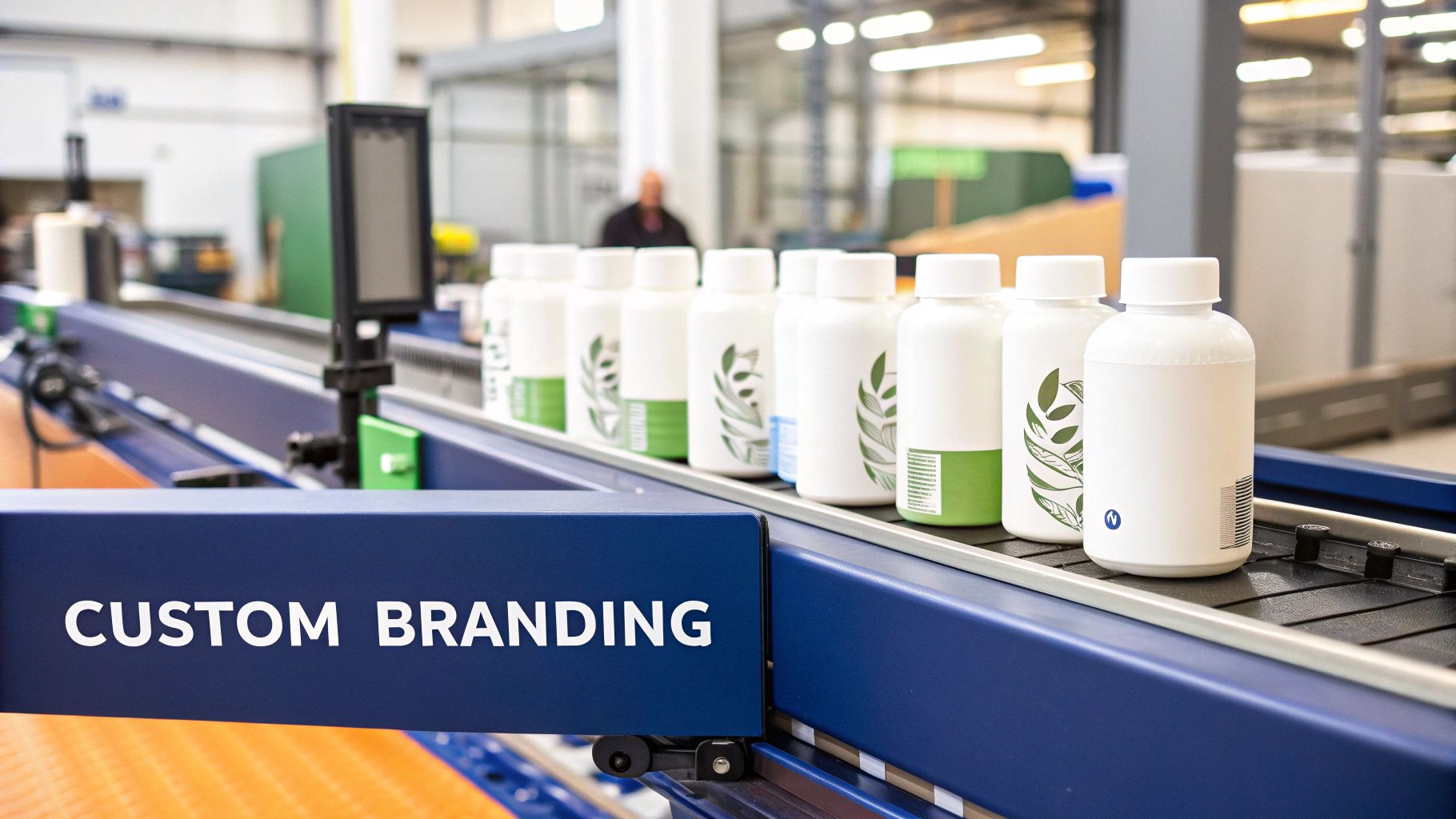Zeolite Private Label Contract Manufacturer Success Guide
Master zeolite private label contract manufacturer partnerships with proven strategies. Transform your business with expert guidance.
 Get a Free Quote Today!
Get a Free Quote Today!Why Smart Businesses Choose Zeolite Private Label Partnerships
Breaking into a new market often feels like a monumental task. It can demand huge capital for specialized equipment, a deep well of technical knowledge, and months or even years of research and development. For businesses looking at the zeolite sector, however, a private label partnership offers a far more direct route. It's like chartering a fully equipped expedition with seasoned guides instead of trying to build all the gear from the ground up.
This approach lets you bring your brand vision to the market without the multimillion-dollar investment needed for manufacturing facilities. Instead, you can focus on your core strengths: building your brand and connecting with your customers.
This strategy is particularly effective in the zeolite industry because of the material's incredible versatility. Zeolites are crystalline aluminosilicates with a unique, microporous structure. Imagine them as molecular-sized sponges, but with a highly specific and uniform network of pores. This structure allows them to function as exceptionally precise filters, catalysts, and ion-exchange agents across a vast number of applications.
The image above shows the detailed framework of a zeolite. The uniform, repeating nature of these internal channels is the secret to its predictable and powerful performance in so many different fields.
Unlocking a Growing Market Through Partnership
The main benefit of working with a zeolite private label contract manufacturer is gaining immediate entry into a growing and diverse market. Zeolite applications are so widespread that demand remains stable, not depending on the health of any single industry.
To put this into perspective, the global zeolite market was valued at $2,981 million in 2024. It is projected to climb to $4,018 million by 2032, showing consistent and steady growth. This expansion is fueled by the fundamental role zeolites play in everything from petrochemical processing to agricultural soil treatments. If you're interested in the specifics, you can explore more about the zeolite market's growth drivers.
To better understand the wide-ranging impact of zeolites, the table below breaks down their applications and market potential across several key industries.
| Industry | Primary Application | Market Value | Growth Rate | Key Benefits |
|---|---|---|---|---|
| Petrochemicals | Catalytic Cracking | ~$1.2 Billion | ~3.5% CAGR | Increases gasoline yield, improves efficiency |
| Water Treatment | Ion Exchange (Softening) | ~$650 Million | ~4.2% CAGR | Removes heavy metals and ammonia, softens water |
| Agriculture | Soil Amendment | ~$300 Million | ~5.5% CAGR | Improves water retention, nutrient delivery |
| Construction | Lightweight Concrete | ~$250 Million | ~4.8% CAGR | Reduces density, improves insulation properties |
| Animal Feed | Toxin Binder | ~$200 Million | ~6.0% CAGR | Binds mycotoxins, improves animal health |
As the data shows, zeolites are not a niche material. Their use is integrated into foundational sectors of the global economy, promising a stable and expanding market for any business that enters the space.
The Strategic Advantages of Private Labeling
Opting for a private label partnership delivers several key operational and financial benefits that support quick market entry and long-term growth. Here are the most important advantages:
- Reduced Capital Expenditure: You avoid the huge costs tied to building, staffing, and maintaining a specialized manufacturing facility.
- Speed to Market: A good contract manufacturer already has established processes, supply chains, and quality control systems, which dramatically cuts down your product development timeline.
- Access to Expertise: You immediately benefit from your partner’s deep institutional knowledge in material science, product formulation, and regulatory compliance.
- Scalability and Flexibility: You can easily increase or decrease your production volume based on market demand without being limited by your own manufacturing capacity.
By teaming up with an expert zeolite private label contract manufacturer, businesses can skillfully bypass the most significant barriers to entry. This model turns a capital-heavy industrial project into a brand-focused, agile business opportunity. It frees you up to innovate on your product’s application and marketing, rather than getting stuck in the complexities of production.
Decoding The Technical Excellence Behind Zeolite Manufacturing
Choosing the right manufacturing partner means looking beyond the sales pitch and understanding what happens on the factory floor. Zeolite production isn't your typical assembly line; it's more like molecular architecture. The process is a carefully controlled sequence where raw materials are guided into forming perfect, crystalline structures. Knowing the basics is essential when you evaluate a potential zeolite private label contract manufacturer, because not all operations have the same technical skill.
At the heart of making zeolites is a process called hydrothermal crystallization. Imagine using a highly specialized pressure cooker for creating minerals. A precise recipe of silica, alumina, and a structure-directing agent (SDA) is mixed into an alkaline solution. This mixture, or slurry, is heated in a sealed reactor where temperature and pressure are managed down to the smallest detail. Under these exact conditions, the raw materials dissolve and then piece themselves back together into the specific, porous framework of a zeolite.
The SDA is particularly important here—it acts like a molecular blueprint, guiding the silica and alumina to form pores of a specific size and shape. Even minor shifts in temperature, pressure, or the chemical mix can lead to a completely different, and potentially useless, final product. This is why consistent quality from one batch to the next is a clear sign of a first-rate manufacturer.
Key Production Steps and Quality Control
Creating the right molecular structure is just the first major milestone. The entire production journey involves several vital stages, each needing its own set of strict controls:
- Synthesis: As we just covered, this is the "growing" phase where zeolite crystals form under specific hydrothermal conditions.
- Filtration and Washing: After crystallization, the solid zeolite is separated from the leftover liquid. It must be washed completely to get rid of any stray chemicals that could clog its pores.
- Drying and Calcination: The washed zeolite is first dried to remove water. Then, it undergoes calcination—a process of heating it to high temperatures. This step burns away the organic SDA template, which opens up the internal pore network and "activates" the material for its job.
- Ion Exchange (Optional): For many uses, the sodium ions that are part of the initial zeolite framework are swapped out for other cations (like calcium or potassium). This step fine-tunes the zeolite’s properties for specific tasks, such as water softening or acting as a catalyst in chemical reactions.
For example, established producers like Zeolyst feature a broad portfolio of specialty and custom zeolites, which points to their advanced technical capabilities.

The range of product families and their applications shown on their site gives you a sense of the expertise needed to produce such a varied lineup. Each product requires its own unique synthesis formula and strict quality checks, showing a deep understanding of zeolite science and manufacturing. A competent partner will implement stringent quality control at every stage, using advanced tools like X-ray Diffraction (XRD) to confirm the crystal structure and Scanning Electron Microscopy (SEM) to check particle size and shape.
Navigating The High-Value Specialty Zeolite Market
While the general zeolite market shows steady growth, the most significant profit opportunities are found in the specialty zeolite segment. This is where partnering with an expert zeolite private label contract manufacturer becomes a powerful advantage. Unlike commodity zeolites used in bulk, think of specialty variants as custom-forged tools, each engineered for a specific, high-performance job. This technical precision is what allows them to command higher prices.

This market is growing quickly, pushed forward by two main forces: stricter environmental rules and technological progress that demands better materials. The global move toward greener solutions has created strong demand for zeolites in applications like advanced catalysts for cleaner fuel and as environmentally friendly alternatives in detergents and water purification. This trend creates a clear opening for private label brands to enter the market.
Identifying Profitable Niches for Your Brand
Success in the specialty market depends on finding an underserved need and delivering a high-quality solution. The approach is to look for areas where a specific zeolite property—like a unique pore size or a particular cationic exchange capacity—can solve a distinct industrial problem. A skilled contract manufacturer can be a key ally here, helping you create a product with clear technical advantages.
Some of the most promising areas for private label entry right now include:
- Specialty Catalysts: These are used in petrochemicals and fine chemical production to make reactions more efficient and reduce waste.
- Advanced Adsorbents: These are used for medical oxygen concentrators, purifying gases, and removing specific pollutants from air or water.
- Eco-Friendly Formulations: Zeolites are increasingly popular as replacements for phosphates in high-performance detergents and as soil improvers in precision agriculture.
The financial forecast for this sector is exceptionally strong, which shows its growing importance. The specialty zeolite market was valued at $7.66 billion in 2024 and is expected to climb to $8.47 billion by 2025, showing a remarkable compound annual growth rate (CAGR) of 10.6%. This growth underscores the rising demand for specialized, high-performance materials in modern industries.
Strategies for Market Entry and Positioning
To break into this market, your strategy should center on value, not volume. This means building your private label brand around superior performance, consistency, and technical support. Your contract manufacturer's ability to produce a custom-formulated zeolite that perfectly fits your target application is your greatest competitive edge. Focus on solving a specific pain point for a niche audience, and you can establish a strong market position that isn't as vulnerable to price wars with larger commodity suppliers.
Choosing Your Ideal Manufacturing Partner
Selecting a zeolite private label contract manufacturer is one of the most important decisions you'll make for your brand. This choice is much more than just finding a supplier; it's about forming a partnership with a company that shares your commitment to quality and supports your growth. Think of it as recruiting a co-founder for your product line—you need shared values, open communication, and a mutual dedication to excellence to succeed. A poor choice here can result in production delays, inconsistent product quality, and a tarnished brand reputation.
The evaluation process needs to be methodical and detailed. Don't rely on glossy brochures or surface-level conversations alone. You must dig deeper to confirm a potential partner's actual capabilities and operational standards. While cost is an important consideration, it should never be the only factor driving your decision.
A Framework for Strategic Evaluation
To make an informed choice, you need a clear framework that weighs technical ability, regulatory compliance, and business compatibility. Begin by outlining your specific needs and then measure potential partners against these essential benchmarks.
This decision tree provides a straightforward way to conduct an initial screening based on production volume, required certifications, and cost structure.
Using this visual guide can help you narrow down your options efficiently, pointing you toward manufacturers that align with your scale and quality standards before you commit more time to in-depth investigation.
Key Criteria for Due Diligence
Once you have a shortlist of potential partners, the detailed work of due diligence begins. Your objective is to verify their claims and truly understand their operational capacity. The principles for this process are consistent, whether you're sourcing industrial materials or supplements. For a more detailed look at this topic, our guide on finding a reputable supplement manufacturer offers additional insights.
To help structure your deep-dive evaluation, the following table outlines the crucial factors to consider. It provides a systematic way to compare potential partners and ensure no critical detail is overlooked.
| Evaluation Category | Key Factors | Weight (%) | Assessment Method | Success Indicators |
|---|---|---|---|---|
| Technical Expertise | In-house R&D, hydrothermal synthesis, ion exchange, calcination capabilities. | 30% | Facility tour (virtual/in-person), interviews with technical staff, review of equipment specifications. | Modern, well-maintained equipment; experienced technical team; demonstrated success with similar projects. |
| Quality Management | ISO 9001 certification, batch consistency protocols (XRD, SEM), raw material testing. | 25% | Request and review quality manual, certification documents, and sample batch records. | ISO 9001 certification is current; clear, documented procedures for quality control at every stage. |
| Customization & Innovation | Ability to develop custom zeolite formulations, experience with novel applications. | 20% | Discuss past custom projects, review case studies, inquire about their R&D process. | A portfolio of successful custom formulations; willingness to sign NDAs and collaborate on development. |
| Regulatory & Traceability | Robust material traceability systems from raw inputs to final product, compliance with industry standards. | 15% | Audit of traceability system, request for documentation on regulatory adherence. | End-to-end lot tracking is in place; knowledgeable about regulations relevant to your end market. |
| Business Compatibility | Communication style, production capacity, lead times, financial stability, pricing structure. | 10% | Reference checks, review of financial statements, detailed discussion of terms. | Transparent communication; capacity that aligns with your growth projections; stable financial history. |
This table serves as a scorecard to move your evaluation beyond simple cost analysis. It helps you build a complete picture of each potential manufacturer's strengths and weaknesses.
By systematically assessing each potential zeolite private label contract manufacturer against these criteria, you can identify a partner that not only meets your immediate production requirements but also possesses the expertise and integrity to support your brand's long-term success.
Mastering Quality Standards That Protect Your Brand
When it comes to zeolite manufacturing, quality isn't just about ticking a box on a data sheet. It is the very foundation of your product's performance and your brand's integrity. When you choose a zeolite private label contract manufacturer, their quality management system effectively becomes part of your own. A single sub-par batch can erode customer trust and cause lasting damage to your reputation. This is why carefully examining a potential partner’s quality procedures is not just a good idea—it's critical for protecting your business.

Think of it this way: a world-class chef doesn't just taste the final dish. They meticulously inspect every ingredient that enters the kitchen and oversee each step of the preparation process. In the same vein, top-tier manufacturers establish detailed quality management systems that cover everything from the raw materials they receive to the way the final product is packaged. This attention to detail is what distinguishes a mere supplier from a genuine manufacturing partner.
Essential Pillars of Quality Management
A strong quality framework rests on several key pillars that work together to guarantee consistency and reliability. When you assess a manufacturer, you should look for tangible proof that these systems are actively in place.
- Rigorous Testing Protocols: Leading manufacturers employ advanced analytical instruments to confirm quality at multiple points in production. This involves using X-ray Diffraction (XRD) to ensure the correct crystalline structure has formed and Scanning Electron Microscopy (SEM) to check particle size and uniformity. The ultimate objective here is batch-to-batch consistency.
- Robust Traceability Systems: If an issue ever arises, you need the ability to trace a product all the way back to its origins. A dependable traceability system logs every component, from the exact lot of raw silica to the specific date of calcination and final packaging. This complete visibility is essential for accountability and quick problem-solving.
- Continuous Improvement Processes: The best manufacturers don’t stand still; they are always refining their operations. They should have a formal system for spotting areas that need improvement, making changes, and tracking the results. This forward-thinking approach makes their operations stronger over time. The principles of achieving this standard are widely applicable; you can learn more about what goes into quality supplement production to understand how these concepts are used across different industries.
A manufacturer’s commitment to quality is a direct indicator of the respect they have for your brand. By choosing partners who show an unwavering dedication to these high standards, you create a trusted foundation that will secure your business's future.
Capitalizing on the Eco-Friendly Detergent Revolution
The detergent industry is one of the most direct and profitable markets for private label zeolite products right now. For new brands, the timing couldn't be better. A major consumer shift towards environmentally responsible cleaning products is changing how laundry detergents are made, creating a fantastic opportunity for new businesses to enter the market. Major brands are swapping out phosphates, once a key ingredient, for zeolites because of their great performance and eco-friendly nature. This industry-wide change opens the door for new players to make an impact.
Working with a zeolite private label contract manufacturer lets a brand launch a competitive, green detergent without the massive investment of building a chemical plant. A good manufacturing partner can walk you through the specific technical requirements for detergent-grade zeolites. Think of zeolites in laundry soap as tiny, molecular magnets for the minerals that make water "hard." By trapping calcium and magnesium ions, they effectively soften the water, which allows the soap's cleaning agents to do their job much better. This process is called ion exchange, and it’s what makes zeolites an excellent replacement for phosphates.
From Technical Function to Market Success
Understanding how this works is central to building a strong brand story. Your marketing message isn't just about being "eco-friendly"; it's about getting a superior clean through smart, green chemistry. To succeed, private label brands should concentrate on these key areas:
- Targeting the Right Consumer: Focus your efforts on shoppers who read labels and actively look for "phosphate-free" or "eco-conscious" products.
- Highlighting Performance: Stress that your product not only protects the environment but also delivers whiter whites and brighter colors by stopping mineral buildup on fabrics.
- Smart Pricing: Position your detergent as a premium, yet affordable, green choice. Look at what competitors are charging to find a price point that reflects quality without putting off your target audience.
The market for these specialized zeolites is already large and expanding. Projections show the detergent grade zeolite market will grow from $558.26 million in 2025 to $831.11 million by 2033. This is a clear sign of lasting demand from both consumers and industry. You can find more details on the detergent grade zeolite market to grasp the full scope of this opportunity. This growth is pushed by both new regulations and consumer choices, creating a stable foundation for new private label brands. By focusing on a clear message of environmental responsibility and proven cleaning power, you can build a strong position in this growing market.
Your Complete Roadmap To Private Label Success
Turning a private label idea into a real, money-making business requires a clear plan. This roadmap splits the journey into simple phases, guiding you from that first spark of an idea to a successful launch. Following these steps helps you work better with your zeolite private label contract manufacturer and sidestep common mistakes that can sink a new product before it even gets started. Think of this as a flexible guide, not a strict set of rules, for building your brand from the ground up.
Phase 1: Market Research And Product Definition
Before anything else, you need to get a solid grasp of the market. The main goal here is to find a specific customer problem that your zeolite product can fix.
- Identify Your Niche: Who are you selling to? What is their specific pain point? For instance, are you aiming for environmentally aware shoppers looking for better laundry detergents, or are you targeting industrial businesses that need high-grade adsorbent materials?
- Analyze Competitors: Take a close look at the existing private label zeolite products out there. What do they do well, and where do they fall short? Search for gaps in the market—maybe in product formulas, quality standards, or even how they present their brand.
- Define Your Product: You need to create a detailed product specification sheet. This document should lay out everything: the exact type of zeolite, the particle size you need, the required purity levels, and what kind of packaging will work best. This sheet is critical for communicating clearly with potential manufacturing partners.
Phase 2: Launch and Growth
With your product manufactured, the next step is to get it into the hands of customers and grow your business. This part is all about action and making adjustments as you go. Many of the strategies here are similar to those in other private label markets, and you can find more practical tips in our guide on starting your own private label liquid supplement brand.
Your initial launch needs a well-thought-out marketing plan across multiple channels to create brand awareness. To expand your product's reach and improve your marketing, using one of the top affiliate management software options can help you build and automate a sales network. Finally, you need to track your success. Set up key performance indicators (KPIs) like customer acquisition cost (CAC) and customer lifetime value (LTV). These numbers will help you make smart, data-backed decisions and ensure your brand grows sustainably for the long haul.
Ready to turn your zeolite product vision into reality with a trusted partner? Contact Triton Nutra Group today to discuss your project and see how our expertise can accelerate your success.